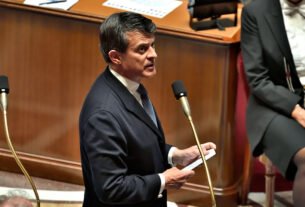Welcome back. Busy summer? We spent the warm weeks sipping tripels at the local guinguette, sharpening pencils and girding our loins (see below). Autumn may be approaching, but amongst the chattering classes, things are heating up. Stay tuned for some big announcements from us later in the week. But for now, we are…
Any European who has ever worked for a US company knows them: the loud, cocksure executive who descends on the Continent from the New World to remind us wine-swilling, pungent cheese-eating, Gitanes-smoking, holiday-obsessed bon vivants what losers we are.
Or, as our American friends down Rue de La Loi would say: ‘Meet Cally Baute’.
Over the summer, the Big Politico Bosses in Washington sent Chief Commercial Officer Baute to Europe “to partner with Jamil Anderlini”, the regional director. Read: Cally’s in charge.
If Baute’s previous foray into the European business – which left much of Politico’s events operation ‘searching for new opportunities’ – is anything to go by, her engagement here will be fast and furious.
While that’s no surprise, we were a bit shocked to hear that Euractiv is at the top of Cally’s enemies list. Hot off Axel Springer’s annual confab for top brass in Berlin in July, Cally told her European colleagues her aim was not just to beat Euractiv, but to put us so thoroughly out of business that our proprietors would rue the day they decided to invest.
That’s according to three people who heard Cally make the threat during an internal Q&A with Freddie Martyn, Politico’s longtime Brussels-based flack. When we asked Freddie about the comments, however, he professed ignorance: “I did not hear her say that or even know that she said that, so I can’t possibly comment”.
Strange, that. While we’ve gotten used to Politico’s ‘unconventional’ business tactics (especially Freddie’s specious claims to “scoops”), Baute’s attempt to turn what we regarded as a good-natured rivalry into a transatlantic version of hip-hop’s ‘East-Coast West-Coast beef’ offends our delicate European sensibilities of decorum.
We jest. We aren’t really worried. If Politico is going back to Cally, so be it. What’s the worst that could happen to us?
On a wing and a prayer
It’s the red diamond of print journalism whose discovery can make a career. In the trade it’s known as ‘the perfect anecdote’, that colourful blow-by-blow tale that keeps readers scrolling in anticipation, and prompts rivals to hurl their phones across the room.
Every experienced reporter has believed to have had one within grasp at some point in their career only to discover a lump of coal. Facts have a nasty habit of getting in the way.
Most of the time, anyway. Which brings us to the story of the week: the FT’s decidedly exclusive account of Ursula von der Leyen’s supposedly harrowing 31 August flight to Bulgaria’s second city, Plovdiv.
For those who missed it, the paper reported that von der Leyen’s jet was “hit by suspected Russian GPS interference” that left her plane “deprived of electronic navigational aids”.
The jamming, according to the report, “forced the European Commission president’s plane to land using paper maps”.
“After circling the airport for an hour, the plane’s pilot took the decision to land the plane manually using analogue maps,” reads the FT report, which cites unnamed officials who described the episode as “undeniable interference”.
Needless to say, even in this newsy environment, there’s hardly a juicier story than the Commission president’s plane allegedly suffering a jamming attack at the hands of Moscow.
The FT’s “scoop” made headlines around the world. And then it went into a tailspin.
On 2 September, a day after the FT article appeared, Dutch blog ‘Feit of fake’ cited flight data and audio recordings of the interaction between Bulgarian air traffic control and von der Leyen’s pilots that cast doubt on key aspects of the story, including that her plane was forced to circle the airport for an hour and that the pilots resorted to paper maps to land.
“The aircraft—a Belgian-registered Dassault Falcon 900 (OO-GPE)—was the only business jet landing at Plovdiv on August 31,” Feit of fake wrote. “Its track log shows no evidence of circling for an hour.”
On the recordings published by Feit of fake, von der Leyen’s pilots can be heard calmly asking for permission to use standard back-up radio-based navigation known as VOR and ILS, which the traffic controller approved.
Enter ‘Maverick’
The day after the FT’s article was published, it emerged that the reporter who wrote it, Brussels bureau chief Henry Foy, had been on the plane himself, a fact that wasn’t mentioned in the original dispatch, which carried a Vilnius dateline.
In an FT podcast on 2 September, Foy not only stuck to the debunked story, he spiced it up even more.
“On the approach to Plovdiv, we lost altitude,” he said. “We came down preparing for landing, and then all of us on board realised that we were circling the airport and we had been for a while. We were way past the planned landing time, and it was only when we actually got on the ground that we were told the reason for the delay was because the GPS services weren’t working. The pilot was not able to use the standard electronic navigational systems and had to land the plane manually using maps.”
Asked if von der Leyen’s plane was intentionally targeted, Foy, citing Bulgarian officials, said: “it appears that that particular flight was targeted with a more regional GPS spoofing or interference of some kind.”
According to tracking service Flightradar24, the flight lasted 1 hour and 57 minutes – only nine minutes longer than scheduled.
In a jam
So far, the Bulgarian authorities have provided no evidence that von der Leyen’s plane was directly targeted, much less of “spoofing” attacks, which aim to deceive a GPS receiver into reporting incorrect positions and speeds.
“There is no indication of the presence of prolonged interference and jamming,” Bulgarian Prime Minister Rosen Zhelyazkov told his parliament on 4 September. He also ruled out “spoofing” and said later that Bulgaria had asked the jet operator to clarify if the instruments on the plane detected jamming because the ground systems had not. He also noted that on the day of von der Leyen’s flight, 54 incidents of interference were registered on Bulgarian territory.
This “has been happening every day since the war in Ukraine began,” he said.
In other words, though there may have been general signal interference by the Russians in the area, as is often the case in the region, there is so far no evidence to suggest that von der Leyen’s aircraft was singled out for manipulation.
“Let me just clarify that we have never been speaking of a targeting ourselves,” Commission spokesperson Arianna Podestà said on 4 September during a press briefing after Zhelyazkov’s remarks. “We are extremely well aware…that this is a matter that occurs to many aircraft in Europe on a very regular basis.”
To recap: So far, there’s no evidence von der Leyen’s plane was targeted; her pilots didn’t rely on paper maps to land; and her plane didn’t circle Plovdiv for an hour before landing.
So why hasn’t the FT corrected its original story? Unclear. When we asked them to respond to the inconsistencies in their reporting, they declined to comment on the record.
Rotten Luck
Ah, the perils of working in an international milieu. Brussels regional government official Alain Hutchinson was left in no doubt about the joys of multilingualism after he told Euractiv in an interview that expats in the EU bubble need not fear the wave of gang violence because it only affects “rotten” areas like Molenbeek and Anderlecht.
The former francophone Socialist MEP manages the relationship between Brussels and its international bodies, like the EU, and is still in the job he’s held since 2014 because of the region’s continued inability to form a government since last year’s elections.
His comments made a splash in Belgian national politics, and were seized upon by far-right Flemish party Vlaams Belang to attack Hutchinson’s socialist party. Outlets contacted Hutchinson to check whether he really did say “rotten.” First he tried denial, telling Le Soir that he had actually said “underprivileged” areas. But the newspaper, with a little assistance from Euractiv, verified the recording of the interview, and proved him wrong.
He then changed tack, telling BRUZZ he meant to say underprivileged and that his words were taken out of context (they weren’t), and blaming the fact that the interview was in English (Hutchinson’s British father liberated Brussels from the Nazis in 1944). He then doubled down, saying that he’d said: “the shootings are happening in disadvantaged neighbourhoods of Brussels;” several media pointed to shootings this summer in Ixelles and the central Brussels City commune.
Finally he told The Brussels Times that he’d never even heard of Euractiv. “This may seem somewhat surprising for a Brussels liaison to the EU,” the Brussels Times wrote.
The Carousel (Politico edition)
Gerardo Fortuna, a Euronews reporter, is joining Politico’s Brussels playbook as “author”. It’s the latest triumph for Mario Draghi’s biggest fan following his surge among “EU influencers” alongside the likes of Stuart Lau and Georgi Gotev. Heady times, indeed!
Carrie Budoff Brown, lately of NBC News in the US, and formerly of Politico in Washington and Brussels, returns to the European capital and Politico on 9 September as the red top’s executive editor.
Zoya Sheftalovich, the pen and brains behind Brussels Playbook for the better part of a decade is also returning to our fair city from down under to become Politico’s chief EU correspondent.
And coming over from Trump’s US embassy in Brussels to make sure they toe the line will be Gavin Sundwall, joining the management as Politico’s communications director for Europe.
Congratulations to them all!
(cp)





